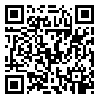1- Department of Public Health, School of Health, Jiroft University of Medical Sciences, Jiroft, Iran , rezanarani732@gmail.com
2- Department of Public Health, School of Health, Jiroft University of Medical Sciences, Jiroft, Iran
2- Department of Public Health, School of Health, Jiroft University of Medical Sciences, Jiroft, Iran
Abstract: (10 Views)
Background & Objective: Self-Regulated Learning (SRL) helps students do better in school and stay more interested in learning. This study looked at mental factors that affect SRL among students using the Health Action Process Approach (HAPA).
Materials & Methods: This study used a method where data was collected at one point in time. We chose 194 students in 2025 using a multi-stage sampling method. We collected data using two main tools: a standard SRL questionnaire and a researcher-made questionnaire based on HAPA ideas related to SRL. We looked at the data using basic math and multiple regression analysis, with results considered important at p < 0.05.
Results: The analysis showed that risk awareness (Beta = 0.23) and action confidence (Beta = 0.46) strongly predicted SRL intention in the motivation phase, explaining 53% of changes. In the action phase, intention (Beta = 1.39), action planning (Beta = 0.80), and coping planning (Beta=0.60) predicted 49% of SRL strategy changes. In the maintenance phase, maintenance confidence (Beta = 1.44) predicted 56% of SRL changes.
Conclusion: HAPA ideas strongly predicted students' starting, using, and keeping up with SRL strategies. These findings suggest that HAPA's theory framework should be used to help students keep using SRL strategies in school settings.
Materials & Methods: This study used a method where data was collected at one point in time. We chose 194 students in 2025 using a multi-stage sampling method. We collected data using two main tools: a standard SRL questionnaire and a researcher-made questionnaire based on HAPA ideas related to SRL. We looked at the data using basic math and multiple regression analysis, with results considered important at p < 0.05.
Results: The analysis showed that risk awareness (Beta = 0.23) and action confidence (Beta = 0.46) strongly predicted SRL intention in the motivation phase, explaining 53% of changes. In the action phase, intention (Beta = 1.39), action planning (Beta = 0.80), and coping planning (Beta=0.60) predicted 49% of SRL strategy changes. In the maintenance phase, maintenance confidence (Beta = 1.44) predicted 56% of SRL changes.
Conclusion: HAPA ideas strongly predicted students' starting, using, and keeping up with SRL strategies. These findings suggest that HAPA's theory framework should be used to help students keep using SRL strategies in school settings.
Send email to the article author
| Rights and permissions | |
 |
This work is licensed under a Creative Commons Attribution-NonCommercial 4.0 International License. |

